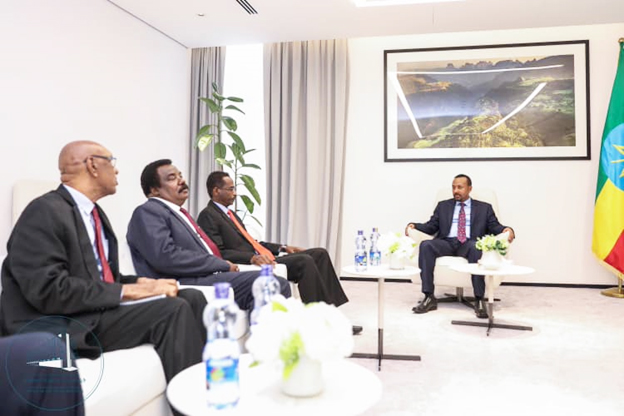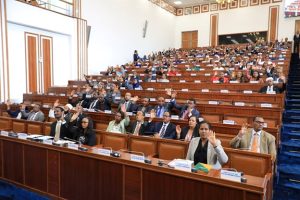
Following the ouster of its longtime leader Omar Al-Beshir, Sudan enters new political developments with the Military Transition Council vowing peaceful transition and experts weigh on Ethiopia and Sudan’s partnership.
While stressing the need to leave Sudan’s internal issues to the Sudanese people, the experts also comment the need to monitor the geopolitical dynamics of the Horn. Sharing borders with seven countries, recent developments in Africa’s third largest country have already attracted the attention of neighboring countries including Ethiopia a long time ally.
As Khartoum has entered new path with a mountain of dossiers awaiting reforms as demanded by the public, Ethiopia vows to support the cause of the Sudanese people in line with Khartoum’s sovereignty.
Early this week, in what could be said a testimony to the strong alliance; Sudanese delegation headed by General Galaledin Alsheikh, Member of the Transitional Military Council of the Republic of Sudan arrived in Ethiopia to give brief on the country’s situation. From the Grand Ethiopian Renaissance Dam to other joint infrastructural facilities, both countries also maintain unwavering people to people relations.
Perhaps that is why, the military council announced no change in foreign policy, conventions and agreements including on the 6,450 MW Dam. Also on Monday, in a communiqué, Prime Minister Dr. Abiy Ahmed said “Our support is based on respect for their sovereignty and the principle of non-intervention, also urged the Military Council to be inclusive in addressing the country’s problems during the transition process.
Despite the strong bilateral relations, scholars advise for being sharp enough to monitor matters in the Horn including the current state of Sudan. What happened in Sudan definitely will redefine the geopolitical dynamics in the Horn.
The change being witnessed in Sudan requires close watch and carful assessment,says Leulseged Girma, a geopolitical researcher at Foreign Strategic relation Studies Institute. Signaling that the partnership between Ethiopia and Sudan is placed string foundation, he underscores.
“There are multiple interests and actors in the region and it demands Ethiopia to continue positioning itself on right path and pursuing warm relation with Sudan.” Though Ethiopia and Sudan maintain strong relations, it also depends on how the two leaders work closely that elevates the growing relation, Leulseged adds.
In fact strong desire was shown by current leaders in Sudan this week. Upon holding talks with Abiy, General Galaledin Alsheikh briefed Prime Minister Abiy Ahmed on the situation in Sudan, noting the relationship with Ethiopia is of significant strategic importance. They called upon the Government of Ethiopia to continue its longstanding support to the country particularly in this time of transition.
“There are common concerns including arms trafficking and borders, these and other economic security issues which the two countries are expected to collaborate on not also to mention GERED and other infrastructural projects.”
Luelseged also notes Ethiopia as member of the African Union and Chair of the IGAD could help the transition in Sudan in many ways in manner that respects the sovereignty of Sudan.
Prime Minister Abiy Ahmed reaffirmed the support of the Government of Ethiopia to the people of Sudan, stressing that this support is based on respect for Sudan’s sovereignty and on the principles of non-intervention.
Abiy also encouraged the Transitional Military Council to be inclusive in addressing grievances and concerns as Sudan makes a peaceful transition, according to Office of the Prime Minister. The political transition happing in Sudan will not affect the strong and longstanding partnership between Ethiopia and Sudan, says Dr. Nega Solomon, Political Science Lecturer at Axum University.
The fact that the members of the Transitional Military Council visit to Ethiopia is a strong indicator, he adds. However, he says what happens in Sudan has a mammoth effect and implication in the Horn African geopolitical dynamics. But again there would no policychange from the Sudanese side believing the two countries continue to bolster ties.
“Both countries share common destines in economic, social and other aspects and it behoove the two countries to keep the momentum for a common good. I do believe that both countries would remain strong partners at any time in point.”
While the Sudanese people have the uncontested share in the internal matters, neighboring countries should play positive role that would contribute to the peace stability of not only Sudan but also the whole region.
“Sudan is a big country that it shares boundaries with plenty of countries with imminent spillover effect. And it proves rational to keep a close watch in the political developments of the country.
The good thing is that the bilateral ties between Addis Ababa and Khartoum is strong enough that it never gets in to trouble as a result of political change be it in Ethiopia and Sudan. Ambassador Mohamud Dirir, advisor to the Ministry of Foreign Affairs says seating at the epicenter of a very strategic area; Sudan is an important Ethiopian ally.
Both countries have lots of joint matters in areas of economic integration, border issues and others. Hence the relation should be dealt carefully and wisely. Mohamud also notes Ethiopia’s contribution to Sudanese transition depends on how the Sudanese people want it to be.
The Ethiopian Herald April 19, 2019
BY DESTA GEBREHIWOT





